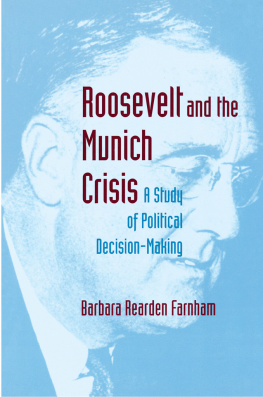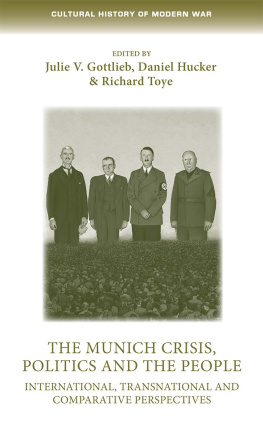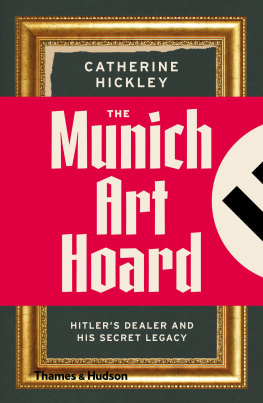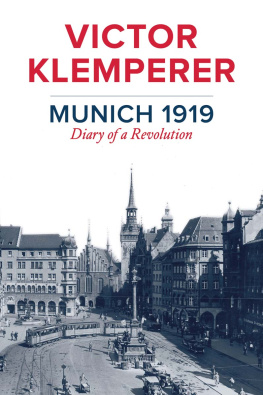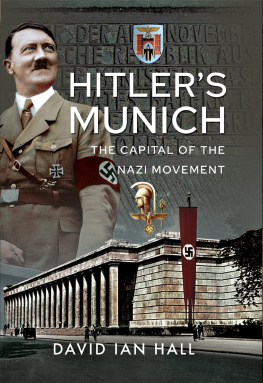ROOSEVELT AND THE MUNICH CRISIS
PRINCETON STUDIES IN
INTERNATIONAL HISTORY AND POLITICS
Series Editors
Jack L. Snyder and Richard H. Ullman

History and Strategy by Marc Trachtenberg (1991)
George F. Kennan and the Making of American Foreign Policy, 1947-1950 by Wilson D. Miscamble, C.S.C. (1992)
Economic Discrimination and Political Exchange: World Political Economy in the 1930s and 1980s by Kenneth A. Oye (1992)
Whirlpool: U.S. Foreign Policy Toward Latin America and the Caribbean by Robert A. Pastor (1992)
Germany Divided: From the Wall to Reunification by A. James McAdams (1993)
A Certain Idea of France: French Security Policy and the Gaullist Legacy by Philip H. Gordon (1993)
The Limits of Safety: Organizations, Accidents, and Nuclear Weapons by Scott D. Sagan (1993)
Mercenaries, Pirates, and Sovereigns: State-Building and Extraterritorial Violence in Early Modern Europe by Janice E. Thomson (1994)
We All Lost the Cold War by Richard Ned Lebow and Janice Gross Stein (1994)
Who Adjusts? Domestic Sources of Foreign Economic Policy during the Interwar Years by Beth A. Simmons (1994)
Americas Mission: The United States and the Worldwide Struggle for Democracy in the Twentieth Century by Tony Smith (1994)
The Sovereign State and Its Competitors by Hendrik Spruyt (1994)
The Korean War: An International History by William W. Stueck (1995)
Cooperation among Democracies: The European Influence on U.S. Foreign Policy by Thomas Risse-Kappen (1995)
Cultural Realism: Strategic Culture and Grand Strategy in Chinese History by Alastair Iain Johnston (1995)
Does Conquest Pay? The Exploitation of Occupied Industrial Societies by Peter Liberman (1996)
Satellites and Commisars: Strategy and Conflict in the Politics of the Soviet-Bloc Trade by Randall W. Stone (1996)
Useful Adversaries: Grand Strategy, Domestic Mobilization, and Sino-American Conflict, 1947-1958 by Thomas J. Christensen (1996)
Roosevelt and the Munich Crisis: A Study of Political Decision-Making by Barbara Rearden Farnham (1997)
ROOSEVELT AND THE
MUNICH CRISIS
A STUDY OF POLITICAL
DECISION-MAKING
Barbara Rearden Farnham
PRINCETON UNIVERSITY PRESS PRINCETON, NEW JERSEY
Copyright 1997 by Princeton University Press
Published by Princeton University Press, 41 William Street,
Princeton, New Jersey 08540
In the United Kingdom: Princeton University Press, 3 Market Place,
Woodstock, Oxfordshire 0X20 1SY
All Rights Reserved
Second printing, and first paperback printing, 2000
Paperback ISBN 0-691-07074-1
The Library of Congress has catalogued the cloth edition of this book as follows
Farnham, Barbara.
Roosevelt and the Munich crisis : a study of political decision-making I Barbara Rearden Farnham,
p. cm. (Princeton studies in international history and politics)
Includes bibliographical references and index.
ISBN 0-691-02611-4 (cloth : alk. paper)
1. United StatesForeign relationsGermanyCase studies. 2. United StatesForeign relations1933-1945Decision makingCase studies. 3. GermanyForeign relationsUnited StatesCase studies. 4. Munich Four-Power Agreement (1938). 5. Roosevelt, Franklin D. (Franklin Delano), 1882-1945.
I. Title. II. Series.
E183.8.G3F37 1997
940.53'2273dc20 96-27218
This book has been composed in Sabon
www.pup.princeton.edu
eISBN: 978-0-691-22751-1
R0
To William T. R. Fox and Robert Jervis
Preface
FOR HISTORIANS, explaining Franklin Delano Roosevelts foreign policy in the years before World War II has long represented a major challenge. An equally vexing problem for students of international politics has been to understand the impact of domestic politics on foreign policy. Believing that progress in unravelling one of these puzzles might help in deciphering the other, I have brought them together. As a consequence, this book offers both a theory of how the domestic political context affects foreign-policy decisions and a fresh interpretation of Roosevelts policies following the Munich crisis, which is based largely on the insights that theory provides.
Between 1936 and 1938, in the face of uncertainty about the possibility of socializing the fascist dictators to the norms of the international system, Roosevelt searched for ways to influence the deteriorating international situation. His behavior during this period has often been characterized as drifting. In fact, he was experimenting with a number of different options in an effort to discover one that might work. In 1938, when Hitlers behavior during the Munich crisis showed him to be incorrigibly aggressive, Roosevelt, his uncertainty dispelled, settled on the policy of aiding the European democracies, a course to which he adhered despite substantial opposition from congress and members of his own administration. This option attracted him principally because it allowed him to deal with a serious problem he had perceived in the aftermath of the Munich crisis: the conflict between the need to stop Hitler and the domestic imperative to avoid any risk of American involvement in a war.
Establishing these connections shed a good deal of light on Roosevelts behavior, but it did not explain it. In search of additional insight, I turned to decision-making theory. Unfortunately, existing theoretical approaches to value conflict offered little help, largely because they ignored the influence of political factors on decision-making. This led me to seek a fresh perspective, which I have called a political approach to decision-making. This approach focuses on the impact that an awareness of the imperatives of the political context can have on decision-making processes and, through them, policy outcomes. In particular, this approach suggests that in dealing with a clash of central values such as Roosevelt faced, decisionmakers who are aware of the demands of the political context are likely to be reluctant to make trade-offs, seeking instead a solution that gives some measure of satisfaction to all the values implicated in the decision.
The political approach to decision-making thus attempts to show both why domestic factors are important from the decision-makers point of view and how they are likely to affect foreign-policy decisions. Viewing Roosevelts behavior in this light has allowed me to uncover patterns, link events, and find meaning in behavior that others have characterized as random or drifting. Rather than paralysis in response to the fear of domestic repercussions, we see purposeful behavior directed at balancing international imperatives against domestic acceptability. To be sure, Roosevelts policies can still be criticized, but at least they begin to make sense.
To the extent that this new approach is successful, it underlines the value of bringing the perspectives of a number of disciplines to bear on a common problem. Recognizing, however, that all readers are not equally interested in history, political science, and psychology, the most important chapter here for those concerned with decision-making theory is chapter 2, which lays out the political approach to decision-making, and the three appendices, which describe the traditional approaches to decision-making and provide a more detailed discussion of the political approach. Those whose primary interest is the development of Roosevelts foreign policy may find that chapter 1 provides enough theoretical background to allow them to follow my analysis of his behavior and prefer to go directly to the four historical chapters.

